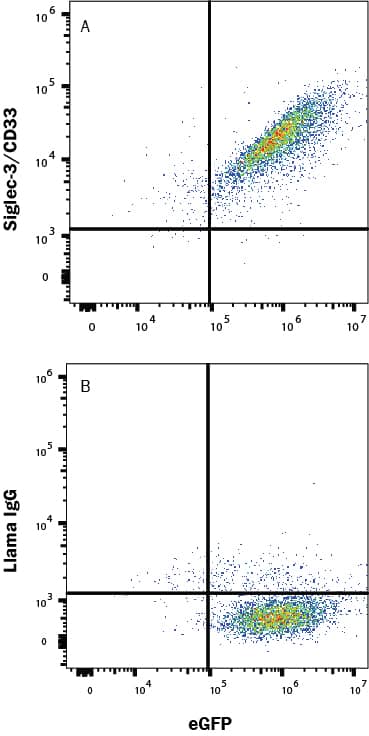Human Siglec‑3/CD33 LlamabodyTM VHH His-tag Alexa Fluor® 647‑conjugated
Antibody
R&D Systems, part of Bio-Techne | Catalog # LFAB10733R


Key Product Details
Species Reactivity
Applications
Label
Antibody Source
Product Specifications
Immunogen
Val18-His259
Accession # AAA51948
Specificity
Clonality
Host
Isotype
Scientific Data Images
Detection of Siglec-3/CD33 in HEK293 Human Cell Line Transfected with Human Siglec-3/CD33 and eGFP by Flow Cytometry.
HEK293 human embryonic kidney cell line transfected with human Siglec-3/CD33 and eGFP was stained with (A) Llama Anti-Human Siglec-3/CD33 Alexa Fluor® 647-conjugated Llamabody VHH Monoclonal Antibody (Catalog # LFAB10733R) or normal llama IgG (IC011R). Staining was performed using our Staining Membrane-associated Proteins protocol.Applications
Flow Cytometry
Sample: HEK293 human embryonic kidney cell line transfected with human Siglec-3/CD33 and eGFP
Formulation, Preparation, and Storage
Purification
Formulation
Shipping
Stability & Storage
- 12 months from date of receipt, 2 to 8 °C as supplied.
Background: Siglec-3/CD33
References
- Crocker, P.R. and A. Varki (2001) Trends Immunol. 22:337.
- Crocker, P.R. and A. Varki (2001) Immunology 103:137.
- Angata, T. et al. (2002) J. Biol. Chem. 277:24466.
- Simmons, D. and B. Seed (1988) J. Immunol. 141:2797.
- Freeman, S.D. et al. (1995) Blood 85:2002.
- Taylor, V.C. et al. (1999) J. Biol. Chem. 274:11505.
- Ulyanova, T. et al. (1999) Eur. J. Immunol. 29:3440.
Long Name
Alternate Names
Gene Symbol
UniProt
Additional Siglec-3/CD33 Products
Product Specific Notices
This product is provided under an agreement between Life Technologies Corporation and R&D Systems, Inc, and the manufacture, use, sale or import of this product is subject to one or more US patents and corresponding non-US equivalents, owned by Life Technologies Corporation and its affiliates. The purchase of this product conveys to the buyer the non-transferable right to use the purchased amount of the product and components of the product only in research conducted by the buyer (whether the buyer is an academic or for-profit entity). The sale of this product is expressly conditioned on the buyer not using the product or its components (1) in manufacturing; (2) to provide a service, information, or data to an unaffiliated third party for payment; (3) for therapeutic, diagnostic or prophylactic purposes; (4) to resell, sell, or otherwise transfer this product or its components to any third party, or for any other commercial purpose. Life Technologies Corporation will not assert a claim against the buyer of the infringement of the above patents based on the manufacture, use or sale of a commercial product developed in research by the buyer in which this product or its components was employed, provided that neither this product nor any of its components was used in the manufacture of such product. For information on purchasing a license to this product for purposes other than research, contact Life Technologies Corporation, Cell Analysis Business Unit, Business Development, 29851 Willow Creek Road, Eugene, OR 97402, Tel: (541) 465-8300. Fax: (541) 335-0354.
For research use only